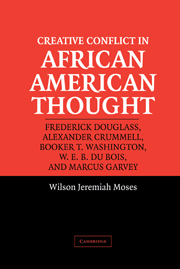Book contents
- Frontmatter
- Contents
- Acknowledgments
- Preface: Struggle, Challenge, and History
- 1 Introduction: Reality and Contradiction
- FREDERICK DOUGLASS: THE INDIVIDUALIST AS RACE MAN
- ALEXANDER CRUMMELL: THE ANGLOPHILE AS AFROCENTRIST
- BOOKER TALIAFERO WASHINGTON: THE IDEALIST AS MATERIALIST
- W. E. B. DU BOIS: THE DEMOCRAT AS AUTHORITARIAN
- MARCUS MOZIAH GARVEY: THE REALIST AS ROMANTIC
- CONCLUSION: RESCUING HEROES FROM THEIR ADMIRERS
- Index
Preface: Struggle, Challenge, and History
Published online by Cambridge University Press: 07 November 2009
- Frontmatter
- Contents
- Acknowledgments
- Preface: Struggle, Challenge, and History
- 1 Introduction: Reality and Contradiction
- FREDERICK DOUGLASS: THE INDIVIDUALIST AS RACE MAN
- ALEXANDER CRUMMELL: THE ANGLOPHILE AS AFROCENTRIST
- BOOKER TALIAFERO WASHINGTON: THE IDEALIST AS MATERIALIST
- W. E. B. DU BOIS: THE DEMOCRAT AS AUTHORITARIAN
- MARCUS MOZIAH GARVEY: THE REALIST AS ROMANTIC
- CONCLUSION: RESCUING HEROES FROM THEIR ADMIRERS
- Index
Summary
In the puerile slang of the present age, “struggle” seems to mean no more than floundering or flailing. When a sportscaster refers to a football team as “struggling,” it is equivalent to describing them as culpably deficient. To an earlier generation struggle was a necessary ingredient of progress and the mark of moral virtue. In Theodore Roosevelt's Darwinian conception of the “Strenuous Life” any individual who was not struggling was contemptibly weak – unfit for survival. The five thinkers addressed in these pages celebrated their own conception of “the strenuous life,” for they believed moral fitness to be inseparable from constant moral struggle.
The words “challenged” and “history” likewise underwent bizarre transformations in the late twentieth century. To describe someone as “challenged” became tantamount to declaring that they were retarded or deficient. In teenage slang, the clause “he's history” implied that someone had been destroyed or rendered irrelevant. But in the romantic idiom of the late nineteenth century, “struggle” implied Sturm und Drang – storm and stress – the characteristic and necessary drive of the “world-historical figure” to meet the challenges of a heroic destiny. The hero of Goethe's Faust knows that he is damned if he even momentarily relaxes from struggle, or apprehends a happiness so great that he wishes the moment to endure forever; the Hegelian or Emersonian hero recognizes no higher praise than the description “He's history!”
The presupposition of this book is that all active thinking runs unavoidably into contradiction; that original thought is generated by the tragic and heroic struggle to reconcile conflict; that mythologies represent the spontaneous struggle of the human mind to encompass opposing ideas within a single thought-image.
- Type
- Chapter
- Information
- Creative Conflict in African American Thought , pp. xi - xviiiPublisher: Cambridge University PressPrint publication year: 2004



